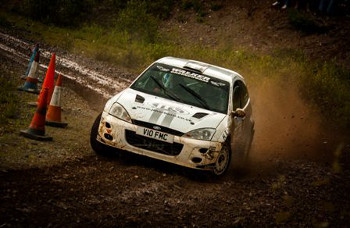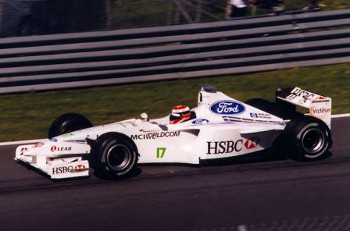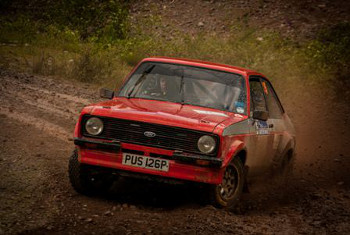Ford Motorsport: A Brief History
Written by Frazer McMenzie
Pictures by Daniel McMenzie
 RSAC Dumfries 1In the 1950’s two men called Harley Earl and Bill France Sr. coined the phrase "Race on Sunday, Sell on Monday." Over the past 40 years Ford have built part of their business model on this in the U.K.
RSAC Dumfries 1In the 1950’s two men called Harley Earl and Bill France Sr. coined the phrase "Race on Sunday, Sell on Monday." Over the past 40 years Ford have built part of their business model on this in the U.K.
Mr. Earl and Mr. France came up with the notion that a car that is successful on a racetrack would translate into successful sales in the showroom. Ironically the aforementioned Gentlemen did not work for Ford; they worked for Pontiac, a division of General Motors the arch rival of Ford in the U.S.A. and worldwide to this day!
It was all about selling the dream, the romance, the pedigree and most importantly the bragging rights in the local pub. This is where Ford got things right, investing heavily in various motorsports for a long period of time which cost millions but they understood that selling the road going versions of the cars at an attainable price and there is some serious money to be made.
I will Focus, (pardon the pun) on Ford’s endeavours in European Motorsports as NASCAR just isn't really my cup of Tea! The main three areas of investment for Ford motorsport since they began development of their motorsports program were; Formula 1, World Rally Championship and Touring cars.
The Ford Motorsports division have some impressive accolades with numerous wins in varied disciplines:
SERIES | RACE WINS | MANUFACTURERS TITLES | DRIVERS TITLES |
Formula 1 | 176 | 10 | 13 |
NASCAR | 606 | 16 | 7 |
World Rally | 75 | 3 | 2 |
Touring Car | 175 | 14 | 23 |
 Johnny Herbert 1999 CanadaBelow I have listed what I believe to be three major milestones for Ford Motorsport:
Johnny Herbert 1999 CanadaBelow I have listed what I believe to be three major milestones for Ford Motorsport:
1967 - Jim Clark, driving a Lotus-Ford, won the Dutch Grand Prix. This is Ford's first grand prix victory.
2003 - Giancarlo Fisichella, driving a Jordan-Ford, won the Brazilian Grand Prix. This is Ford's 176th and last grand prix victory.
2011 - Trevor Bayne wins the 2011 Daytona 500 in a 1-2-3 finish for Ford. It would be Ford's 600th NASCAR victory.
With Ford seeing success on the track the road going versions of the World Rally cars and the Touring Car Championship were ready for production. In the U.S.A. there was the Ford Performance Vehicles, Special Vehicle Team (SVT), North America's performance car division. In Europe our road going racers were given the RS and ST, Ford Team RS European performance car divisions (Ford's ST and RS.) The most iconic of the badges were the RS models. The Ford RS badge was born for rally racing, the RS stands for Rally Sport. Below I have listed the RS range a true Ford fans ultimate garage:
 RSAC Dumfries1970 - Ford Escort RS1600, Ford Capri RS2600
RSAC Dumfries1970 - Ford Escort RS1600, Ford Capri RS2600
1973 - Ford Escort RS2000, Ford Capri RS3100
1975 - Ford Escort RS1800
1976 - Ford Escort RS Mexico, Ford Escort RS2000 Mk II
1981 - Ford Escort RS1600i
1984 - Ford Escort RS Turbo, Ford RS200
1985 - Ford Sierra RS Cosworth
1987 - Ford Sierra RS500 Cosworth
1988 - Ford Sierra Cosworth
1990 - Ford Sierra Cosworth 4x4. Ford Fiesta RS Turbo
1991 - Ford Escort RS2000
1992 - Ford Escort RS Cosworth, Ford Fiesta RS1800
1994 - Ford Escort RS2000 4x4
2002 - Ford Focus RS
2009 - Ford Focus RS Mk II
2010 - Ford Focus RS500 Ford ST models
1997 - Ford Mondeo ST24
2000 - Ford Mondeo ST200
2002 - Ford Focus ST170, Ford Mondeo ST220
2004 - Ford Fiesta ST
2005 - Ford Focus ST
The RS range of fast fords has been the most successful in capturing the imagination of the public. All of the RS range was developed for Rallies testing man and machine, durability and speed to the upmost in locations all over the world in all kinds of conditions.
Ford had a long and successful history in rallying, winning the World Rally Championship (WRC) in 1979 with the Ford Escort RS1800 and drivers Hannu Mikkola, Björn Waldegård and Ari Vatanen. In 1986 the Group B Ford RS200 made its debut, but by the end of the year Group B was banned. From 1987 Ford Motorsport entered the Ford Sierra. The Ford Escort RS Cosworth was introduced in 1993 and won rallies until 1996. For 1995, Ford handed over the running of its programme to RAS Sport of Belgium. At the end of 1996, Ford of Europe and its motorsports arm selected Malcolm Wilson and his M-Sport company to run the cars in the WRC from 1997 onwards.
Formula One is the biggest stage in the world for Driver and manufacturer alike. The team's origins are traced back to 1988 when Jackie Stewart's son Paul set up Paul Stewart Racing at the end of 1988 when he bought the Gary Evans Motorsport Team. His team entered the 1989 British Formula 3 season with a workforce of 10 employees. The team attracted the sponsor Camel. Paul Stewart had driven the car alongside German Otto Rensring. The team's first season had not been hugely successful with a sole win for Stewart at Snetterton. In 1990, the team expanded with a move to their headquarters in Milton Keynes and was divided into three sections; preparation for European Formula 3000, Formula 3 and Formula Vauxhall Lotus. Within a few years, the team enjoyed huge success in Motor Racing by winning 12 titles and 119 races in various categories. Jackie Stewart secured a five-year development deal with Ford to make it a factory team. Ford had been in a deal as a factory engine supplier to Sauber before this.
After Ford acquired Cosworth in July 1998, they risked designing and building a brand-new engine for 1999. The SF3 was quick out of the box, however for Ford both cars over-heated on the grid of the first race, the Australian Grand Prix, after qualifying competitively. This put Herbert out instantly and made Barrichello start from the pit lane. Barrichello received a stop-go penalty during the race and finished 5th. The car was consistently competitive throughout the season; however the engine initially proved fragile as both cars blew their engines at the Brazilian race which meant the engine was rarely run at full power. Stewart's competitiveness was affirmed by running first in Brazil for a long spell of the race and qualifying on pole for the French Grand Prix with Barrichello. Johnny Herbert won a popular victory at the rain soaked 1999 European Grand Prix at the new Nürburgring after other leading contenders crashed off the track or lost time in the pits changing tyres. After Ford increased its commitment by buying the team out, it became known as Jaguar Racing for the 2000 season. Poor results however, led to the team being sold for the 2005 season, becoming Red Bull Racing.
Ford have had the success on the track and this has translated into showroom sales being the most popular car on the U.K. roads and winning car of the year in many European countries. In the ever changing car consumer market the emphasis has now shifted to the eco consumer and the fuel economy weary customer. But I say if you want Ferrari thrills without the bills you can never go wrong with a fast Ford!
Copyright © 2012, DPNLIVE – All Rights Reserved










